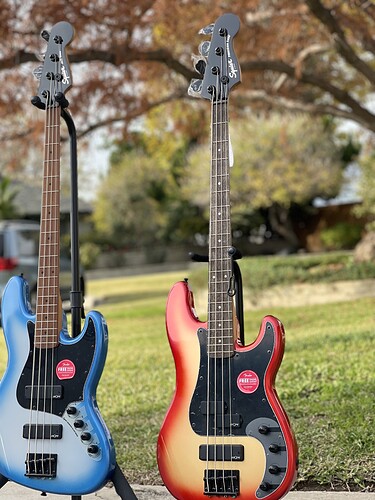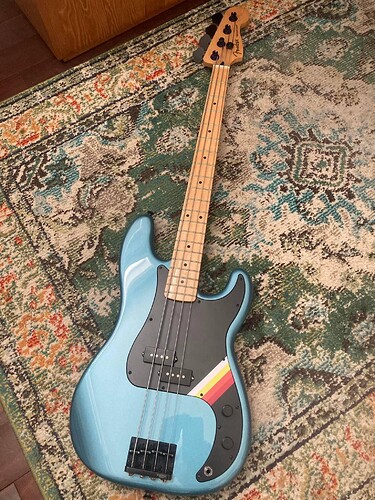My son gigs with the Sire P5 which was around $500. Amazing instrument and it is holding up nicely so far.
Sires are exceptional values. Their materials, fit and finish seem impossible to achieve for the money. Their high QC comes from building basses in a single factory Sire owns.
A P5 is a great bass. If I were in the market for a P, I’d scoop one up in a heartbeat. That said, I would swap out the stock pup for a Nordstrand NP4 or an old school-sounding Fralin.
These are the best sub $500 basses you can buy for studio recording. Looks and feel awesome and buffer a killer tones. I’d gigged with these no questions.
Active electronics, hum-free and roasted maple neck. I picked it up @$200 a piece well the p bass got a $50 discount for a drop crack.
Actually I think @Gth is not far off with his original statement, but I would put the cutoff at about $750-1k.
Just picking on Fender here, a Yamaha BB734A is every bit as good as any MIA Fender I have tried. There is no MIA Fender that I would trade by Yamaha SBV-550 for, it’s just really well made. And my MIJ Fender P-Bass would be as good as a MIA with a simple tuning machine swap - the electronics are already better, as is the bridge, and the fit and finish of the rest are top notch.
Switching to Gibson, my MIJ Fender P exceeds the quality of any Gibson bass I have tried, even just in subjective “this feels solid.”
Are there more expensive basses that are “better”? Yes of course, but diminishing returns sets in VERY fast. And they are not “light years” better; they are incrementally better in minor ways, at least in my experience. A $10k Fodera is not twelve times better an instrument that a MIJ Fender. It simply is not.
You have to own a Fodera to determine if it’s 2x, 5x, 20x better. Otherwise, opining is pure conjecture.
If you own a Fodera, you almost assuredly have both affinity and confirmation bias after dropping $10k on a bass.
Believe it or not, it’s possible to get qualitative opinions from just seeing something and checking it out in person, rather than needing to purchase it.
Is it worth 10-20x more to a Fodera owner? Well, that’s a subjective choice and the answer is “probably” I would guess. But overall instrument quality and playability is more objective than that.
And of course, mileage varies. These are all generalities here. But in general, no, you’re simply not going to be getting an instrument that is 10-20x more effective at being an enjoyable bass by spending 10-20x more, at least once you’re past some initial threshold of spending.
Also, note that this is not negative on the quality of the expensive instruments in any way. They are fantastic. It’s just that in the last 20 years or so, the midrange instruments in the $1k range have gotten very, very good as well. I’m blown away by how much better things are now than in the '80s.
My second bass was a Made in Mexico Fender P Bass that I bought new for $550. I modded it a little bit and I’m never selling this bass (You can screenshot that!). I love playing it and I’m convinced that buying a MIJ or MIA Fender P Bass wouldn’t make me any happier than I already am. Sometimes you get lucky I guess.
The right bass is the right bass.
Interestingly, I went the reverse direction… bought a over $500 bass for my first one and a 5 string at that. Just purchased a $200 4 string so I could re-visit the slap module and actually learn something without wanting to throw something through a window.
Confirmation bias is a hell of a rose colored pair of glasses ![]()
Yeah. I’ll trust neutral observers over owners most of the time.
The best thing is, we are each free to trust whom we choose. Personally, I’ll take owners over opiners every single time. YMMV.
My second bass was and still is the Yamaha TRBX504. My first was the TRBX304.
To answer your questions -
Does the 504 play better? - From a techniques standpoint no - it has the same neck and body shape.
Does it sound better? - To me yes. The upgraded electronics, pickups and an active/passive switch make all the difference. There again whether or not you like the sound is very subjective.
Does it have a better build quality? - IMHO - No (as far as Yamaha models are concerned). I honestly believe Yamaha does a great job in quality control compared to other manufacturers. I own several Yamaha electric and acoustic products and have never had any issues with them. One of my Yamaha acoustics is over 40 years old and still plays great.
Less static noise. - This was never an issue with either of my Yamahas. YMMV with other makers.
I would say that the fast neck on the TRBX series are a big selling point for Yamahas and would advise that if you do decide to go with a different manufacturer you physically check out the other manufacturer’s necks.
In the end any upgrade choice is yours alone to make, just be sure you upgrade to something that you enjoy playing.
I hope this is of some help to you. ![]()
My first bass was an Ibanez GSR-200 PJ. Sold it after 6 months, bought a Donner P-clone for the money for that. I sold it, when I bought the bass I lusted after since before B2B - the Steve Harris Fender P. In the meanwhile, I became a Peavey bass fanboy, especially '80s and early '90s models.
I sold the Ibanez, because I didn’t like the sound too much, and the preamp was disappointing. Funnily enough, the Donner P was a great bass, and I would have kept it, if it wasnt for my SH fixation.
I would not have predicted this
Beware of a neutral or unbiased reviewers especially on the InterWebs. I’d often prefer bias reviews. It’s easy to judge and gauge the information I need for my bias needs.
There’s nothing wrong with high end/ high price anything. When it comes to bass it’s not about the tone. If you are running a studio rental and need to fill the studio with instruments you can do that on the cheap because you can just buy the Asian imports and they will do the job well on their own but you also have to consider the plugins and modelings.
You can computer match pretty close may be 90% of the tone from a $250 retail bass to a premium $2500 bass of any pickup configurations. It’s difficult to match the reputation and craftsmanships which hopefully if you do your homework will result in higher resale value. Some instruments will yield the high resale value. I’m definitely hoping my picks are the right picks so I won’t take any loss owning the instruments.
Making a mix drink at home cost your about $2-3 per glass at the full price consumer purchase. Buy the same drink at some dive bars who pay commercial price for their products and you’d pay $15-20 per drink then compare that again to the high end club and expect to pay $30-50. What’s the difference? Service and ambiance. And we are talking apple to apple here.
Yep, totally true. Tone is easily the most overrated aspect in bass choice. Playability, then looks, then tone for recording. You can fix tone; you can’t fix the others.
I never even think about resale values when purchasing any instruments. Why think about selling something you don’t even own yet.
This is probably why I have never sold any of the instruments I own.
![]()
It’s hard because if I keep everything I buy I’d need a team of lawyers to defend me in divorce court, lol. In all seriousness, I do enjoy selling even more than acquiring it’s what keep me buying. That’s why I don’t own some brands that don’t hold their value well. I’d love to own a Parker Fly bass but if I can’t sell it I won’t even think about. The 2 basses that I’d never sell are the signed Yamaha BBNE2 and the Lignum Fretless. The rest at some point will either get traded or sold.
I went from 5 but 2 that I use to about 50 since Covid most are from trading and selling and of course spending some on the good ones.

